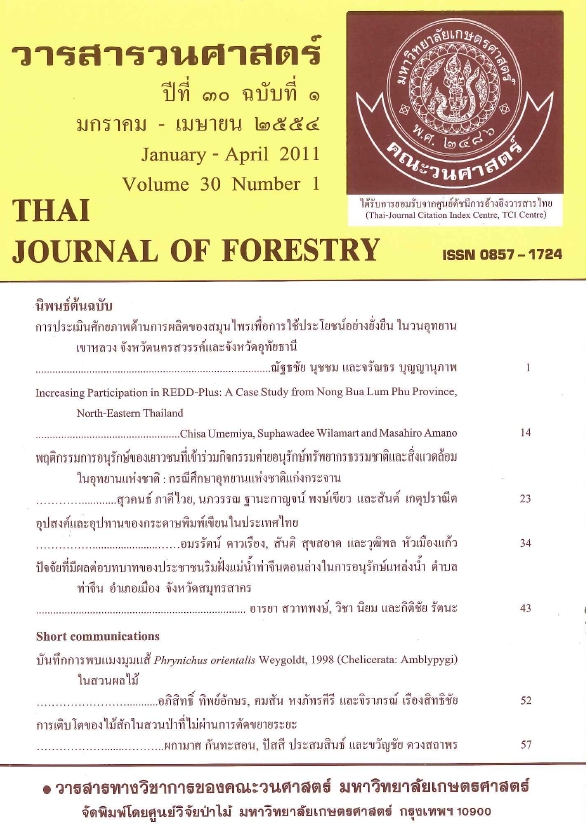Increasing participation in REDD-plus: a case study from the Nong Bua Lum Phu Province, North-eastern Thailand
Main Article Content
บทคัดย่อ
Lately, under the UN Framework Convention on Climate Change (UNFCCC), there have been discussions on how to incorporate the mitigation efforts of tropical nations in the forestry sector, a process that is known as REDD-plus. As featured at the Fifteenth Conference of Parties (COP15) to the UNFCCC held in 2009, one key element of future REDD-plus is to ensure the broad participation of developing countries. By taking one farmer’s plantation activity in Northeast Thailand that achieved wide participation, this study examined how a diverse range of farmers were able to be involved in the activity. Principal component analysis (PCA) was used to analyze the planters’ motivation. It was found that their motivation varied with their level of income. For wealthy planters, technical kinds of support were particularly motivational; for medium-income and commercial low-income planters, the economic merits of plantations were a key factor; and for poor farmers, a reliable long-term partnership was found to be essential to them. Therefore, it is suggested, for REDD-plus to be widely accepted, various incentives, including non-economic ones, should be prepared so that a wide range of farmers can participate in such a plantation scheme. Further, it is suggested that REDD-plus could effectively promote farmer’s plantation schemes by applying the fund system specifically to enhance a participant’s capacity and capability, and the market mechanism to deliver the economic benefits.
Keywords: participation, farmers’ plantations, incentives, REDD-plus, Thailand
Downloads
Article Details

อนุญาตภายใต้เงื่อนไข Creative Commons Attribution-NonCommercial-NoDerivatives 4.0 International License.
ข้าพเจ้าและผู้เขียนร่วม (ถ้ามี) ขอรับรองว่า ต้นฉบับที่เสนอมานี้ยังไม่เคยได้รับการตีพิมพ์และไม่ได้อยู่ในระหว่างกระบวนการพิจารณาตีพิมพ์ลงในวารสารหรือสิ่งตีพิมพ์อื่นใด ข้าพเจ้าและผู้เขียนร่วม (ถ้ามี) ยอมรับหลักเกณฑ์และเงื่อนไขการพิจารณาต้นฉบับ ทั้งยินยอมให้กองบรรณาธิการมีสิทธิ์พิจารณาและตรวจแก้ต้นฉบับได้ตามที่เห็นสมควร พร้อมนี้ขอมอบลิขสิทธิ์ผลงานที่ได้รับการตีพิมพ์ให้แก่วารสารวนศาสตร์ คณะวนศาสตร์ มหาวิทยาลัยเกษตรศาสตร์ กรณีมีการฟ้องร้องเรื่องการละเมิดลิขสิทธิ์เกี่ยวกับภาพ กราฟ ข้อความส่วนใดส่วนหนึ่ง หรือ ข้อคิดเห็นที่ปรากฏในผลงาน ให้เป็นความรับผิดชอบของข้าพเจ้าและผู้เขียนร่วม (ถ้ามี) แต่เพียงฝ่ายเดียว และหากข้าพเจ้าและผู้เขียนร่วม (ถ้ามี) ประสงค์ถอนบทความในระหว่างกระบวนการพิจารณาของทางวารสาร ข้าพเจ้าและผู้เขียนร่วม (ถ้ามี) ยินดีรับผิดชอบค่าใช้จ่ายทั้งหมดที่เกิดขึ้นในกระบวนการพิจารณาบทความนั้น”


